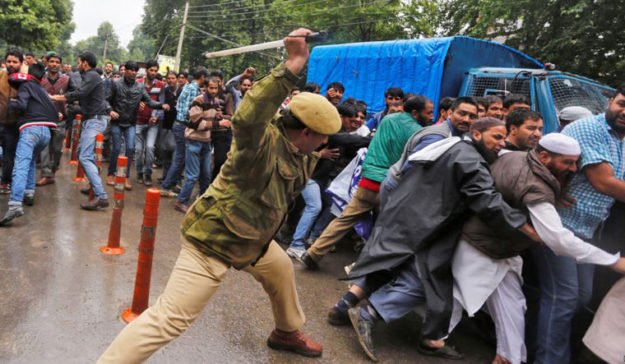
[Photo source - Express Tribune]
Just as Palestine continues to fight for its freedom, so are the people of Indian Occupied Kashmir, who next week observe 75 years of Indian tyranny, writes Mehr un-Nisa.
The dark chapter in Kashmir’s history began on October 27, 1947, when Indian forces entered Srinagar, the capital of the princely state of Jammu and Kashmir without any legal justification, effectively taking control of the region. What followed over the seven decades that ensued is a heart wrenching tale of unimaginable suffering for the innocent and unarmed Kashmiri population.
Their lives have been marked by violence and an orchestrated campaign of oppression carried out by the Indian occupation forces.
The Indian illegally occupied Kashmir is a unique place where over 900,000 Indian troops continually test the patience of unarmed Kashmiris. Military cantonments have sprung up outside nearly every Kashmiri’s home, subjecting their lives to a constant state of siege. To move from one place to another, Kashmiris must navigate numerous checkpoints – and they have paid a heavy toll for their peaceful protests.
Thousands have been injured by bullets, shrapnel, and tear gas fired by Indian forces, and tragically, many young boys and girls have lost their eyesight due to pellet injuries.
In IIOJK, the brutal tactics of the Indian security forces persist, and to date, more than 95,728 innocent Kashmiris, including 7,155 held in custody since January 1989, have made the ultimate sacrifice for their struggle for freedom.
These killings have left 22,924 women widowed and 107,811 children orphaned. Over 8,000 Kashmiris have suffered from custodial disappearances, and the honour and dignity of Kashmiri women have been violated, with more than 11,231 Muslim women facing disgrace and molestation.
Each day brings forth a new tale of sorrow, a fresh voice of agony, and another horrifying account of torture, trauma, and brutal murder as human rights abuses persist in IIOJK. The Indian security forces in Kashmir seem to have a license to kill under the oppressive “draconian laws” such as PSA, UAPA, and AFSPA. Shockingly, there is little to no accountability for their actions. Despite Amnesty International branding these laws as ‘unlawful, they continue to be wielded by authorities for preventive detentions in Jammu & Kashmir.
One of the cases involving Muzammil Manzoor War, a 25-year-old Kashmiri from Baramulla’s Dangerpora Village, exemplifies the alarming level of reprisals faced by the vulnerable. War was arrested on February 22, 2020, by J&K security forces on false charges of possessing a grenade. Although the High Court nullified the PSA order against War and ordered his release, he remained Incarcerated due to a UAPA case against him, all the while being accused of posing a threat to the “security and sovereignty of the country.” War’s case is not an isolated Incident; thousands of Kashmiris have faced detention under these oppressive draconian laws. There are instances where people were detained under the UAPA for nearly two years, only to be later acquitted by the courts, with charges deemed baseless. War’s story is one of the thousands of such cases which is a stark reminder of the injustice and suffering endured by many in the Indian occupied Kashmir.
Palestine
Parallel to the plight of the people of Indian occupied Kashmir, the international connivance and apathy is the other side of this tale of injustice and cruelty. Perhaps another example of this disgusting lack of concern internationally is Palestine, where Israel has unleashed a reign of terror on the helpless people without any intervention by the world. Just like India occupied Kashmir, today we are witnessing a massive tragedy unfolding in Gaza where Israel is using highly disproportionate use of force to torment the helpless people of Gaza and it is shameful to see powers like USA, UK and EU showing their support to Israel while organisations like UNO and OIC are paying a mere lip service to this matter.
The same goes in Kashmir where despite clear UN Resolutions, continuous Indian atrocities, and repeated episodes of regional level conflicts over the issue, the international community has not done anything substantive to check the inhuman treatment of Kashmiris at the hands of callous Indian occupation forces. This state of affairs is not only painful, but also a bad omen for world peace. History has taught us that when we encourage the oppressor and ignore the oppressed the world awaits a catastrophe. Kashmir is already a hotly contested dispute between two nuclear powers and any further delay in the resolution of this matter is extremely dangerous. The day of 27 October reminds us again that only justice and fair play ensures order and peace, and this is what we need to strive for.
*Mehr un-Nisa is a research scholar at Kashmir Institute of International Relations.


